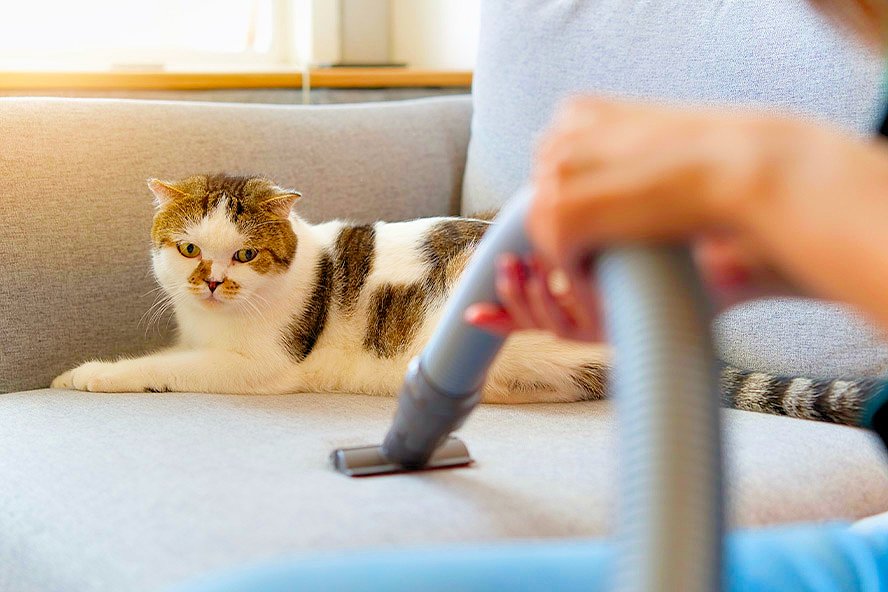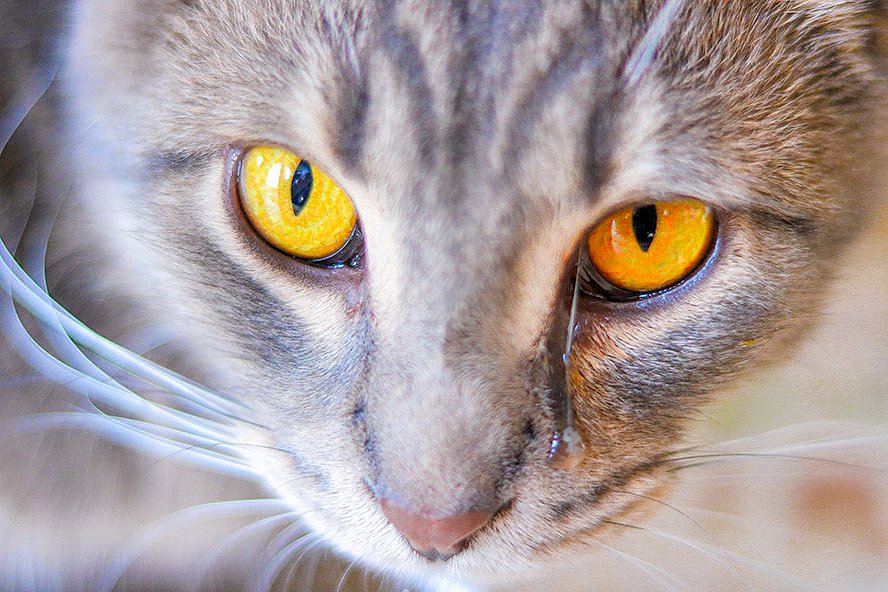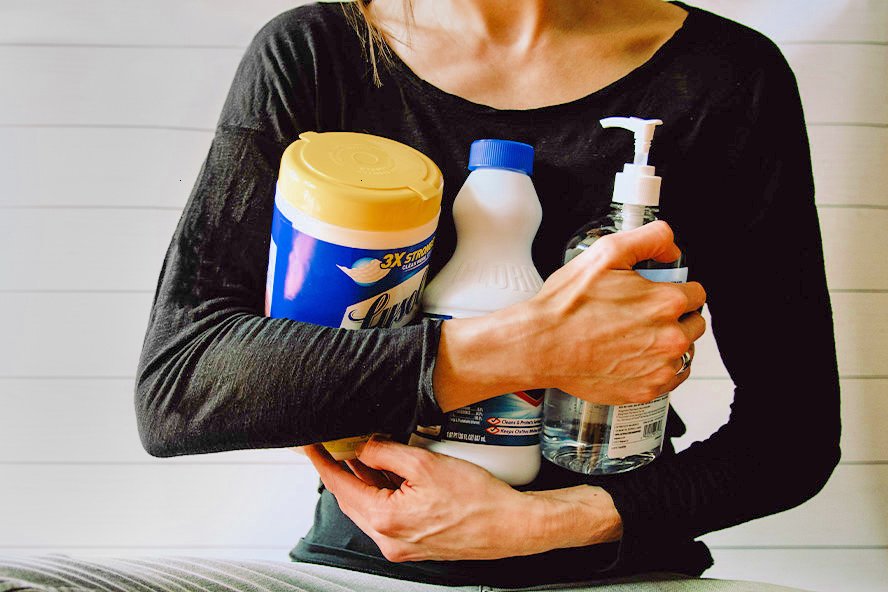cover: Timothy Meinberg | Unsplash
Cat sneezes often. When your cat sneezes, it usually looks very funny. Even your velvet paw has to sneeze from time to time when the nose tickles. But if the sneezing happens more often and for no apparent reason, there may be a serious problem behind it.
Why does the cat sneeze?
Sneezing is a reflex of the body to expel dust, pollen and other foreign bodies from the nose. It is triggered by stimulation of the nerve cells in the nasal mucosa. There is usually a problem in the nose itself, but it can also originate in the sinuses or the oral cavity.
Reasons for sneezing are:
dust
hypersensitivity to fragrances (cleaning products, room sprays, perfumes, fabric softeners)
dry heating air
allergy
foreign bodies, e.g. a stray blade of cat grass
polyp
cat flu
dental disease
fungal infection
cleft palate
tumour
Cat next to a vacuum cleaner.
Hananeko_Studio | shutterstock
Cat sneezes constantly but is fit
If your cat sneezes frequently and otherwise behaves normally, this is a good sign. Many serious illnesses are accompanied by other symptoms.
You should try to find out why the sneezing occurs. Are there circumstances in which your cat sneezes more often? Does the sneezing occur in certain rooms or only at a certain time of the year? Have you used any new cleaning products or conditioners? Observe your cat carefully and try to draw conclusions.
Cat sneezes often in a row
If your cat sneezes a lot one after the other, there is probably something stuck in its nose that is triggering the sneeze. For example, a blade of grass may get stuck there when the cat vomits after nibbling. A polyp, which is a small proliferation of the mucous membrane, may also have formed. So if sneezing does not help to get rid of the foreign body, an examination of the nose should be done.
At the vet's office, your cat may need to be put under a short narcosis if a thorough examination of the nose is necessary. This is because you only have a limited view through the narrow nostrils and an endoscope is often used to remove the foreign body or polyp in the same step.
Abeer Zaki | unsplash
My cat often sneezes and one eye tears
If the sneezing occurs at the same time as a runny eye, the eye is probably also part of the problem. If your cat has this symptom, it should see a vet the next day at the latest.
One possible cause is that your cat may have caught something called cat flu. This often causes both eyes to tear. It is a type of infection that can be caused by various viruses and bacteria. Young cats are especially susceptible, but in general you can protect your cat against it with frequent vaccinations.
If only one eye is runny, it may be due to a dental disease. In the small head of a cat, these areas are close together and inflammation of the roots of the teeth can also affect the eye. Cats are resilient and will often continue to eat even when the teeth or gums are severely inflamed. A watery eye is therefore a warning signal that should not be underestimated.
The cat sneezes and the nose runs
Nasal discharge often occurs at the same time as sneezing. In the case of a viral cat flu, it is usually clear; in the case of a bacterial inflammation, it becomes yellowish to greenish. If the nose is injured internally, the discharge can also be bloody.
This can happen if a fungus has settled in the cat's nose. Cats with a weak immune system, for example if they suffer from an FIV or FeLV infection, are susceptible to this. The fungus spreads and destroys the nasal mucosa, which can cause bleeding.
Kelly Sikkema | unsplash
Cat sneezes, are there home remedies?
The word home remedy can be understood somewhat differently in connection with sneezing. In this case, it is often the home remedies themselves, i.e. perfumes, cleaning products, etc., that cause sneezing. Therefore, if you have a sensitive cat, you should use products with little or no perfume and ventilate well after cleaning. Room fragrances should be avoided altogether, as they can even trigger asthma in some cats.
In winter, a humidifier helps against dry heating air. Our four-legged friends also suffer from dry nasal mucous membranes and are then more susceptible to colds. A bowl of water placed above the heating helps to increase the humidity.
If an allergy is causing the sneezing, your cat should avoid the allergen – although you will of course have to help. For dust mites, you can regularly treat and vacuum all upholstered furniture and wash all bedding. If your cat is allergic to certain houseplants, they will unfortunately have to move in with someone else.
Can sneezing be associated with a tumour?
Rarely, it happens in older cats that a tumour grows in the nose. In this case, in addition to sneezing, there is often nasal discharge on one side. If the tumour spreads, a runny eye may also be present. Sometimes this is also visible from the outside, when a bump forms and the face becomes asymmetrical. Some tumours can be removed surgically, but it is not always possible.
kholywood | shutterstock
When your cat sneezes – when to go to the doctor?
When you hear your cat sneezing, you should listen up. If symptoms such as nasal discharge, watery eyes or loss of appetite are also present, a visit to the vet's office is unavoidable. Only there the nose can be examined thoroughly, maybe even a short narcosis is necessary.
If you want to know whether you can wait another two days or whether you should go straight to the vet's surgery, the confidu diagnosis finder developed by vets can help you. Answer a few simple questions and you'll get an assessment of the severity and urgency of the problem with clear instructions on what to do next.
And the confidu app can do even more: it is your digital patient record with integrated animal health assistant. Bring the patient file up to date after the vet visit. Based on the information you enter, you will receive recommendations and tips on health, feeding and preventive care tailored to your pet's individual situation.
Conclusion
Sneezing is a symptom that usually has harmless causes. Dust, fragrances or dry heating air can irritate the nasal mucosa. Allergies are also relatively common, especially in indoor cats.
However, if the sneezing persists or is accompanied by other symptoms, it may be due to something more serious. If this is the case, take your cat to a veterinary practice so that it can be helped promptly.
The confidu magazine is written by our veterinarians according to current scientific standards. The articles do not replace a veterinary diagnosis, but are intended to provide you with initial information on many topics related to your pet. If you have specific questions about your pet, our veterinarians will be happy to help you via the confidu app.









